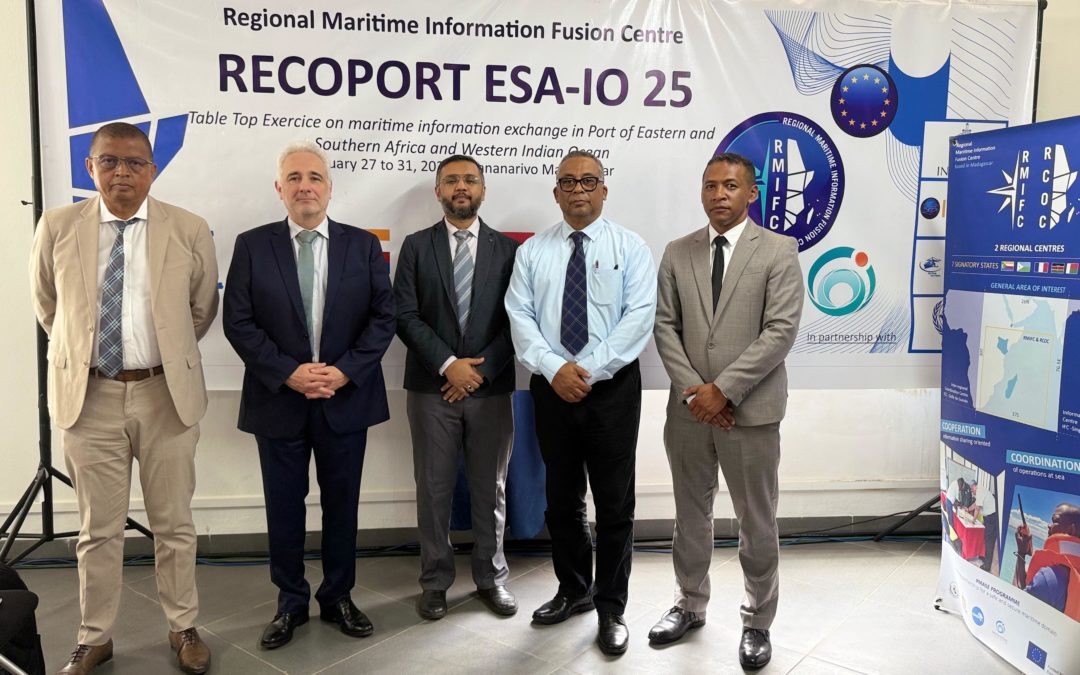Sharing critical port security information is essential to ensuring safe and efficient port operations while effectively responding to emerging security challenges. Ports must work closely with information-sharing organizations, leveraging secure platforms to exchange vital information. Additionally, identifying security gaps, clearly defining roles and responsibilities, and implementing measures to deter, detect, and respond to illegal activities in ports are fundamental to safeguarding these crucial hubs.
In this context, the Regional Maritime Information Fusion Center (RMIFC) in Madagascar and the Port Management Association of Eastern and Southern Africa (PMAESA) have partnered to conduct the joint exercise RECOPORT-ESA 25, with IORIS serving as the main communication platform for all participants.
Starting on January 27, 2025, and lasting for a week, under the patronage of the Madagascar Minister of Transport and Meteorology, port security officers from the Eastern and Southern Africa – Indian Ocean region took part in a virtual simulation exercise at the RMFIC.[1]
The exercise simulated a range of maritime incidents, including stowaway situations requiring a coordinated response, contraband trafficking such as drug smuggling that called for regional enforcement cooperation, theft of goods or vessels within port areas, and illegal trafficking of wildlife and natural resources.
The primary goal of the exercise was to strengthen information-sharing practices among PMAESA member states, enhancing regional maritime security and economic cooperation. This is vital to improving maritime safety, facilitating trade, ensuring emergency preparedness, and ensuring regulatory compliance with international standards. Additionally, the exercise aimed to foster a proactive security culture and promote greater collaboration among member states to address maritime challenges.
Throughout the exercise, IORIS served as a secure web-based platform, enabling the seamless exchange of information across various agencies, both domestically and internationally. This marked the second deployment of IORIS in a port security-focused exercise—following its successful use in South America. This successful implementation further reinforces IORIS’s value as a critical tool for ports in the region.
In fact, by aggregating and analysing maritime data from multiple sources, including Automatic Identification System (AIS) data, satellite imagery, and user-generated reports, IORIS provides port authorities with enhanced situational awareness which allows port authorities to better assess and mitigate potential risks.
Moreover, at the regional level, IORIS also functions as a vital tool for connecting port authorities globally, as it facilitates the exchange of critical information about vessels arriving in their areas of responsibility and enables them to notify authorities at the “Next Port of Call” of any suspicious activities, thus enhancing regional cooperation and response capabilities.
The success of RECOPORT-ESA 25 underscores the vital role of ongoing collaboration and information sharing in maritime security. By strengthening regional partnerships and leveraging IORIS, port authorities can collectively enhance their ability to protect ports, prevent illicit activities, and ensure the safe and efficient flow of trade across the region.
To know more about the advantages IORIS offers for harbour and port operations: https://ioris.org/wp-content/uploads/2025/01/241029-IORIS_Brochure_HARBOUR_A4_V3.pdf
[1] The exercise saw the participation of RMIFC, PMAESA and member countries from the Comoros, Kenya, Madagascar, Mauritius, Seychelles and Tanzania, the lndian Ocean Commission (IOC), Port Security Project, the International Maritime Organisation, the International Labour Organisation, the Regional Coordination and Operations Centre (RCOC), the Agence Portuaire Maritime et Fluvial (APMF), the Centre de Fusion d’Informations Maritime, the Madagascar Customs and Navy, the European Union, the United Nations Office on Drugs and Crime (UNODC), and INTERPOL, Djibouti, Mozambique Somalia and South Africa who participated as observers.

